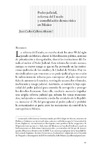| dc.contributor.author | Calleros Alarcón, Juan Carlos | |
| dc.creator | CALLEROS ALARCON, JUAN CARLOS; 38010 | |
| dc.date.accessioned | 2020-07-08T17:11:39Z | |
| dc.date.available | 2020-07-08T17:11:39Z | |
| dc.date.issued | 2017-08 | |
| dc.identifier.citation | Calleros Alarcón, J. C. (2017). Poder judicial, reforma del Estado y consolidación democrática en México. Muuch' xíimbal Caminemos juntos, (5), 41-64. | es_MX |
| dc.identifier.issn | 2395-9819 | |
| dc.identifier.uri | http://repositorio.lasalle.mx/handle/lasalle/1546 | |
| dc.description.abstract | La reforma del Estado, en marcha desde los años 90 en México, abarcó la liberalización política, acciones de privatización, desregulación y las instituciones del Estado al incluir al Poder Judicial. Sin embargo, esta reforma no ha permeado en las instituciones judiciales de los Estados y la Ciudad de México. Asimismo, es notoria la baja capacidad del poder judicial de controlar la corrupción y proteger los derechos humanos. Por ello, debe impulsarse una reforma judicial para subsanar los temas mencionados, instaurar el 2% del presupuesto al poder judicial y prohibir la comunicación exparte entre los mecanismos de control de la corrupción en México. | es_MX |
| dc.description.abstract | The Reform of the State, in course since the 90s of the last century in Mexico, comprehended the political liberalization, privatization and deregulation actions, and the public institutions, including the
judicial sector. This reform has had progresses even if its most notorious shortcomming is that it has not reached the judicial institutions of the states and Mexico City. There are some indicators showing a judicial power that is not robust enough to counterbalance the executive power yet: lack of financial autonomy, restricted access to courts,
inefficiency and judicial workload. All the same, it is notorious the low capacity of the judicial power to control corruption and to protect human rights. In front of this, it would be necessary to deploy an
extensive judicial reform that confronts the aforementioned themes, including its implementation to all entities of the Republic, to set 2% of the national budget to the judicial power, and to adopt the prohibition of ex parte communication as part of the corruption control mechanisms in Mexico. | |
| dc.format | pdf | es_MX |
| dc.language.iso | spa | es_MX |
| dc.publisher | De La Salle Ediciones | es_MX |
| dc.rights | Acceso abierto | es_MX |
| dc.rights.uri | http://creativecommons.org/licenses/by-nc-nd/4.0 | es_MX |
| dc.subject | Poder judicial | es_MX |
| dc.subject | Reforma del Estado | es_MX |
| dc.subject | Reforma judicial | es_MX |
| dc.subject | Consolidación democrática | es_MX |
| dc.subject | Control de la corrupción | es_MX |
| dc.subject | Judicial power | es_MX |
| dc.subject | Reform of the State | es_MX |
| dc.subject | Judicial reform | es_MX |
| dc.subject | Democratic consolidation | es_MX |
| dc.subject | Corruption control | es_MX |
| dc.subject.classification | CIENCIAS SOCIALES::CIENCIAS JURÍDICAS Y DERECHO::OTRAS ESPECIALIDADES JURÍDICAS | es_MX |
| dc.subject.other | Cuestiones políticas y poder judicial | es_MX |
| dc.title | Poder judicial, reforma del Estado y consolidación democrática en México | es_MX |
| dc.type | article | es_MX |
| dc.identificator | 5||56||5699 | es_MX |
| dc.audience | generalPublic | es_MX |







